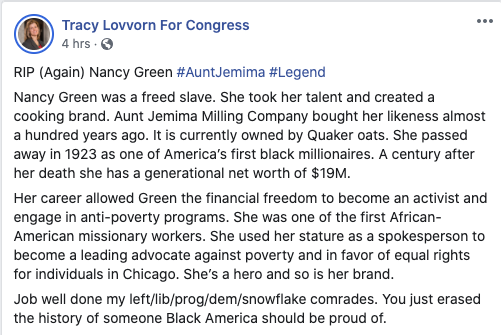A series of posts on Facebook and Twitter responding to Quaker Oats’ decision to discontinue the Aunt Jemima logo and brand went viral as they claimed to tell the history of Aunt Jemima.

The posts make similar claims: that discontinuing the brand is an affront to the legacy of the “original” Aunt Jemima, a former slave named Nancy Green who was the first model hired to portray the character. With a few variations, the posts say that Green created a cooking brand that was purchased by a larger company, which turned the brand into Aunt Jemima and used her likeness to promote the product. As a result, the posts claim, she became a millionaire. The viral tweet further suggests that Green created what became the Aunt Jemima brand, which was bought out by Genera Mills, and the Facebook post claims that Green’s supposed wealth allowed her to become an anti-poverty and equal rights activist.
The actual history of Nancy Green is a little difficult to uncover; record keeping of that period, especially for African-Americans, was spotty. What is known of the life of Green and other African Americans in similar roles at the time, however, indicates that her relationship with the Aunt Jemima brand was not the equal, beneficial partnership that these viral posts make it out to be.
There’s no evidence that Green created a cooking brand or that she inspired the Aunt Jemima image. The Aunt Jemima brand was started by Chris Rutt and Charles Underwood, who named their new pancake flour after a minstrel show song titled “Old Aunt Jemima.” Green was hired after Rutt and Underwood sold the company to R.T. Davis, to portray an image that already existed in popular culture: that of a “mammy,” a racist stereotype of an amiable, older, overweight, African American woman who served in a domestic role to whites. The logo has changed six times in order to move away from the mammy stereotype, meaning the logo currently on Aunt Jemima products does not, as some have suggested, still depict Nancy Green.
Patricia Turner is a professor in UCLA’s Department of African American Studies and senior dean of the UCLA College. Turner is also author of Ceramic Uncles and Celluloid Mammies: Black Images and Their Influence on Culture, a book exploring the portrayal of African Americans in popular culture. In an interview with The Dispatch Fact Check, Turner said that it’s highly unlikely that Green was extraordinarily wealthy: “I know of no record of what they paid her or what that relationship was like, but we do know that black people were exploited by white businessmen; think of what you know about musicians and actors and actresses and writers who never got their share of the product that they produced.”
Turner said it was plausible that Green was paid well enough that she was comfortable, but that she certainly was not a “millionaire philanthropist” as claimed in the viral social media posts. “She might have been paid well enough to support her church and to support some activities, that’s feasible in my mind,” said Turner, “but the stretch between that and what it would have been to have been a millionaire in that era … think of what it would have been, how much money a million dollars would have been in the 1890s and the first couple of decades of the 20th century.”
Given what is known of Nancy Green’s life and of what records of it exist, social media posts downplaying the racist nature of the Aunt Jemima brand rely on factually incorrect information and fabrications for which there is no record.
If you have a claim you would like to see us fact check, please send us an email at factcheck@thedispatch.com. If you would like to suggest a correction to this piece or any other Dispatch article, please email corrections@thedispatch.com.
Photo by Justin Sullivan/Getty Images.






Please note that we at The Dispatch hold ourselves, our work, and our commenters to a higher standard than other places on the internet. We welcome comments that foster genuine debate or discussion—including comments critical of us or our work—but responses that include ad hominem attacks on fellow Dispatch members or are intended to stoke fear and anger may be moderated.
You are currently using a limited time guest pass and do not have access to commenting. Consider subscribing to join the conversation.
With your membership, you only have the ability to comment on The Morning Dispatch articles. Consider upgrading to join the conversation everywhere.